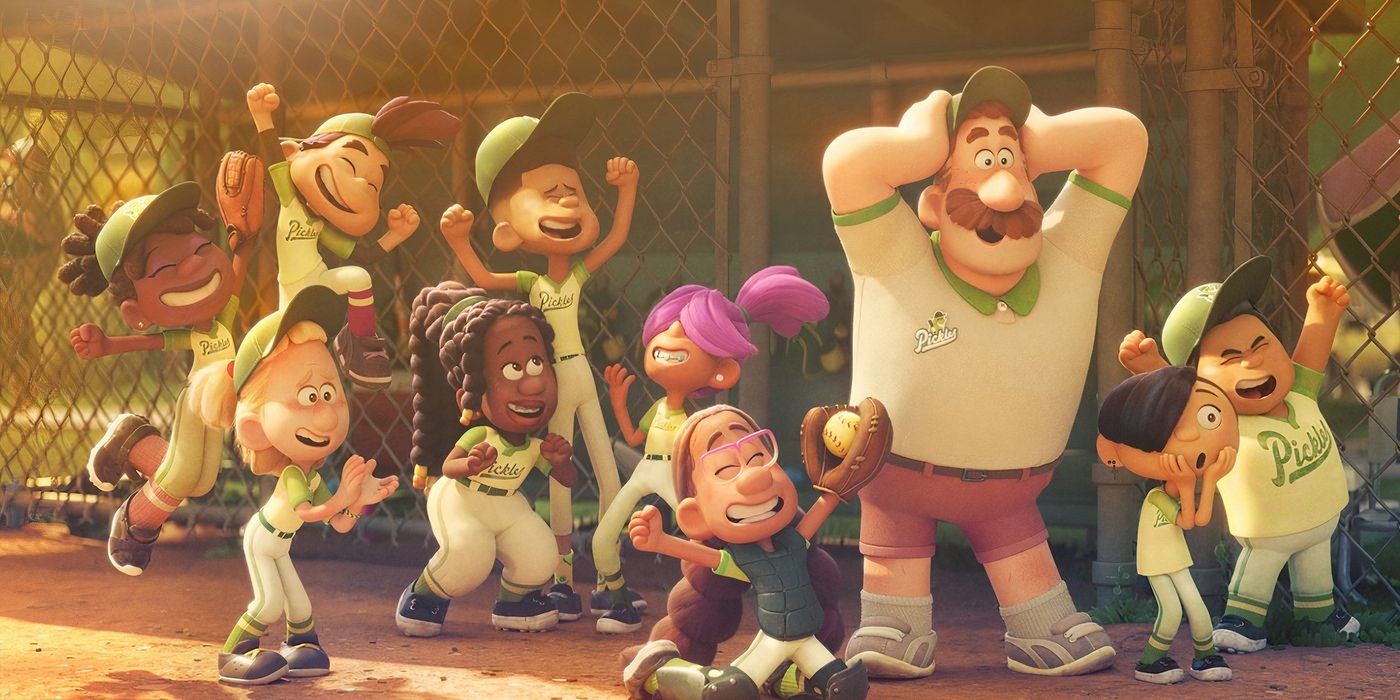
The debut of Pixar’s first original animated series on Disney+ titled «Win or Lose» was met with heated discussions prior to its release. The disputes originated from Disney’s apparent struggle to present an accurate and inclusive portrayal, as allegations emerged that they scrapped a transgender narrative in the series at the eleventh hour. This decision sparked dissatisfaction among both their creative team members and broader audiences when they discovered this change.
Присоединяйся к каналу CryptoMoon! Самые свежие и актуальные новости мира криптовалют ждут тебя! Не упусти шанс быть в курсе всех трендов и инсайдов. 👇
CryptoMoon Telegram
After watching the initial four episodes of «Win or Lose«, I find myself pondering why Disney felt compelled to second-guess their creative team’s decisions, potentially fearing backlash that might jeopardize their already thriving business. However, attempting to decipher seemingly illogical actions can often lead to frustration, and this review is for a well-crafted animated series that, despite being perfectly fine, may not be perceived as controversial by many viewers.
Pixar Returns To Their Origins With An Original Series That Focuses On Innovation

This anthology series, titled «Win or Lose«, delves into the journey of an elementary school softball team as they strive to win the championships. Each episode highlights a team member or a significant adult figure, revealing their personal story that impacts the championship outcome or enriches the overall experience. The show masterfully blends deep emotions with light-hearted humor reminiscent of classic Pixar productions. In terms of style, it deviates slightly from recent works like «Soul» and «Inside Out«, opting for more imaginative portrayals of the characters.
In a captivating manner, «Win or Lose» is engaging, as it dissects a solitary event into multiple tales, thereby crafting a vibrant, lively depiction of a tightly-knit community. Each installment modifies its animation to suit the character it highlights, yet there’s a consistency in both the animation and storytelling that remains consistent throughout. This transition in styles enhances enjoyment while stirring feelings of nostalgia for Pixar’s past prestige, rooted in their groundbreaking and emotive productions.
This marks Pixar’s debut with an original series, providing a sense of liberation as their recent films and shows, such as the anticipated sequel to «Inside Out» and «Toy Story 5», along with the TV productions «Monsters at Work» and «Dream Productions», have all been adaptations. The series «Win or Lose» earns a lot of goodwill for being a distinctive project that tackles various themes, each presented succinctly in episodes lasting less than 25 minutes.
Win Or Lose Has Engaging Themes That Challenge Kids
All While Being Reasonably Entertaining
The program is particularly suitable for younger viewers; it also tries to appeal to older audiences, providing additional depth and educational opportunities for the young. It’s intriguing that mature topics, like post-breakup loneliness (something many adults can relate to), are included, while complex themes such as gender identity and sexuality are often omitted, allegedly too challenging for children to grasp. However, it’s worth noting that experiences like these do affect kids, and yet they’re frequently simplified or excluded from the narrative.
From a movie enthusiast’s perspective, while it might be premature to pass judgment given the latter episodes, if the rumors are accurate and the narrative unfolds as such, Win or Lose seems to struggle in portraying its core concept effectively. This idea is that even though individuals may share a common setting like a community, school, or social circle, they each have unique experiences that can greatly differ from one another, despite apparent similarities that bind them together. Just as we recognize our friends have their own lives, adults included, kids can grasp this concept too — that their peers may be going through things we’re not aware of.
In essence, deleting a plotline featuring a transgender character suggests a lack of faith in children’s understanding and can be seen as an affront to their intelligence. This is particularly true when the series Win or Lose tackles complex issues such as a young girl grappling with her parents’ divorce, anxiety, and feelings of parental disappointment. The subsequent episodes delve into adult themes like a teacher dealing with a broken relationship, a team member struggling with financial insecurity and taking on parental responsibilities, and a single mother battling hardships. These topics necessitate careful discussion with parents or guardians to fully grasp their implications.
To clarify, the Disney+ animated series isn’t just about serious topics and gloominess; it offers excitement, joy, and captivating moments. The opening chapters appear to be leading towards a heartwarming and relieving conclusion, even though not every episode necessarily has a «happy» resolution.
In summary, «Win or Lose» is both enjoyable and enlightening. Regardless of representation concerns, Pixar has demonstrated significant advancement in their character development, animation quality, and storytelling with this series. Simultaneously, the studio and its corporation are reluctant when it comes to representation. However, «Win or Lose» significantly profits from its varied fabric and narratives. It authentically portrays a tightly-knit community, feeling real and sincere in its endeavors to depict this bond.
Similar to Inside Out and Turning Red, «Win or Lose» delves into deeply personal and emotionally intense aspects of the human experience, but through a child’s perspective. This approach could pave the way for more creatively rewarding productions that aren’t just follow-ups.
Смотрите также
- 35 лучших семейных фильмов 2023 года (и где их посмотреть)
- Шокирующая смерть Таноса во втором сезоне «Игры кальмаров»: то, чего вы не ожидали!
- Пуаро Агаты Кристи: 15 лучших серий по рейтингу
- Бонни Блу из OnlyFans занялась сексом с более чем 1000 мужчинами за 12 часов
- 20 отличных корейских дорам с участием ЛГБТК+
- 100 лучших фильмов на Disney+ (ноябрь 2023 г.)
- Силосные спойлеры: что происходит в книгах и самые большие открытия
- 15 дорам с самыми горячими сценами поцелуев, которые заставят вас упасть в обморок
- Раскрыта роковая ошибка Ги Хуна во втором сезоне игры в кальмара
- Концовка «Невидимый гость» и объяснение истинного смысла
2025-02-19 11:07